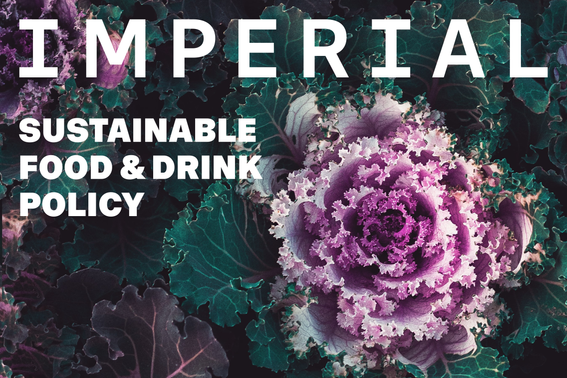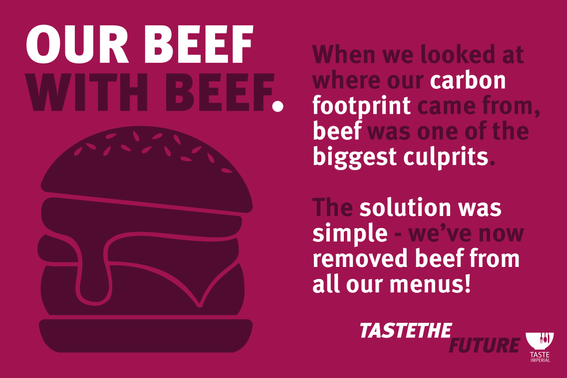Taste Imperial selected as finalists for Green Gown Sustainability Awards
.png)
Taste Imperial (Imperial’s Food and Drink team) were at the Green Gown Awards for sustainability last week as finalists in the ‘Campus Health, Food and Drink’ category.
The Awards recognise exceptional sustainability initiatives in universities, colleges and other institutions in the post-16 education sector. Established in 2004, the Awards are seen as one of the most prestigious in the sector.
Judged by a panel of experts from the sustainability and education sectors, the ‘Campus Health, Food and Drink’ award recognised Taste Imperial’s work to put sustainability at the core of its operations.
Imperial was one of seven institutions that made it to the final; alongside other big universities and colleges, all recognised for their initiatives. The judges were impressed by the team’s integrative, whole-organisation and whole-supply chain approach, that aims to radically reduce the environmental impact of Imperial’s catering operations.
.png)
The awards ceremony was held at Dynamic Earth, Edinburgh’s science centre and planetarium. The evening was hosted by Jo Allatt, Head of Sustainability at UK Research and Innovation, and Charlotte Bonner, CEO of EAUC which is the alliance for sustainability leadership in education. Representatives from Imperial were in attendance along with finalists from 83 educational institutions from the UK and Ireland.
In her speech, Charlotte Bonner highlighted how the Green Gown Awards pride themselves on their peer-reviewed, evidence-led methodology; aiming to recognise legitimate efforts for change rather than ‘greenwashing’ initiatives.
The Green Gown Awards said of Imperial’s application:
“Imperial’s ‘Beef with Beef’ campaign – a successful effort to eradicate beef from all campuses - is impressive in several ways. Everything communicated across the campaign created a joined-up push rather than piecemeal approach.
"The judges appreciated the scientific approach in focusing action on what has the most impact, including the redesign of their offering to cut emissions from beef, a research-led decision based on the analysis of the carbon footprint of the catering options, and supported by the University-wide sustainability strategy.
"The judges agreed this was an evidence-based approach with good leadership and engagement."
.png)
Director of Hospitality, Tony Shepherd, said:
“The accolade of being named a Green Gown Award finalist is, as ever, a testament to the work and commitment of our whole team at every level. The last two years have seen so much enthusiasm, effort and creative thinking from everyone to work towards our sustainability policy and our ambitious goals. We've done so much, but there is always more to do, so watch this space - we've got some exciting new initiatives brewing.”
Further sustainability initiatives highlighted in Imperial’s application included:
Imperial’s Beef with Beef
To reduce our carbon footprint beef has been removed from all our in-house menus (a year ahead of schedule). In some popular dishes, this has been replaced with wild-culled venison, which contains less than a third of the CO2 emissions of farmed beef, while also promoting biodiversity and new forest growth.
Sustainability as Standard
The Sustainable Food and Drink Policy, launched in 2022, aims to put sustainability at the heart of the menus in Imperial’s cafes, restaurants. It shapes how the team procures food and equipment, and also puts the spotlight on increasing awareness of the environmental impact of the food we eat. By weaving these values into the core of how the team operates, the team is able to achieve far more by making small swaps and conscious decisions alongside our flagship policies.
Reducing waste
The team have reduced plastic waste by removing single-use plastic cups from water stations and events catering. A 30p levy on coffee cups has eliminated around 30,000 single-use cups per year. The team have also replaced plastic coffee cup lids with biodegradable lids made from sugar cane pulp.
There’s also been a focus on reducing food waste. The team now use aquafaba (the water leftover from tinned chickpeas) to make their own mayonnaise, and ‘wonky’ fruit to make juices and smoothies. A new cooking oil filtering system has reduced oil consumption by 50%.
Other initiatives include using cleaning products made from, and packaged in, plant based materials; new and more efficient dish and pot washers; and napkins made from recycled Tetra Paks. The Friday Fridge Forage initiative has also just been launched where Imperial’s Development Chef will be showing students how to use up leftover items from the fridge.
Sustainability

Our Sustainability Policy
Read our Sustainable Food and Drink Policy; current goals, ideas and initiatives to reduce our carbon footprint.

Learn more about what we're doing
Find out more about what Taste Imperial are doing to make food and drink at Imperial as sustainable as possible.